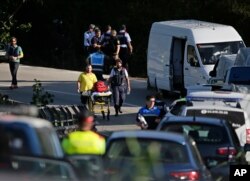A suspect arrested in connection with last week's deadly van attack in Barcelona told Spain's high court Tuesday that the group had been planning a much larger attack using explosives, judicial sources said.
Mohamed Houli Chemlal, 21, was the first of four suspects to testify Tuesday, a day after police shot dead the man they say was the van's driver.
The four are the only surviving suspects of a 12-man terror cell that was behind the attack. Others were either killed by police or died in an accidental explosion at their bomb-making facility on the day before the attack.
After a full-day hearing before the judge, Chemlal and another suspect, Driss Oukabir, 27, were remanded in custody and charged with terror-related offenses.
A third man, Mohamed Aallaa, was granted conditional release. Aallaa owns the car used in Cambrils.
The judge will decide later if the fourth suspect, Salh El Karib should be remanded or released from custody.
The massive manhunt for the last outstanding suspect, Younes Abouyaaqoub, ended Monday in a rural area about 45 kilometers (28 miles) west of Barcelona. Authorities say they shot the fugitive after he appeared to be wearing a bomb belt, which they later discovered was fake.
“We confirm that the man shot dead in #subirats is Younes Abouyaaqoub, author of the terrorist attack in #barcelona,” police tweeted on Monday.
Catalan Interior Minister Joaquim Forn told Catalunya radio that “everything indicates” Younes Abouyaaqoub was behind the wheel of the van during Thursday's Barcelona attack that killed 15 people.
Islamic Connections
Many of the suspects in the attacks had connections to the northeastern town of Ripoll, one of the places where police have focused their investigation.
Authorities say Abouyaaqoub, who was born in Morocco and has Spanish residency, is also suspected of car-jacking a man and stabbing him to death as he made his getaway from the Barcelona attack.
Islamic State claimed responsibility for the Barcelona attack along with another vehicle attack on Friday in which a car crashed into people in the resort town of Cambrils, Spain. The attackers got out of the vehicles and tried to stab people. One person was killed and several were wounded. Authorities believe both attacks were carried out by the same terrorist cell.
Authorities believe an imam named Abdelbaki Es Satty may have radicalized some of those who carried out both attacks. The imam was among those killed in the explosion at the bomb-making facility.
Arrests may have prevented more attacks
Greg Barton, a professor of global Islamic politics at Deakin University, told VOA Spain's previous arrests of terrorism suspects could explain why it has not dealt with the same number of attacks as other countries in Europe, such as France and Belgium in recent years.
“Spain is not immune from these problems, particularly Catalonia, where there are links with northern Morocco,” Barton said. “But Spain up until now has been able to keep on top of the problem, whereas France and Belgium have been struggling.”
Barton also said there does not seem to be any particular link between the influx of migrants to Europe and these attacks.
“The individuals being recruited have largely grown up in the countries where they're recruited and they launch attacks in neighborhoods familiar to them,” he said.










